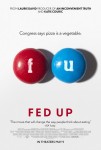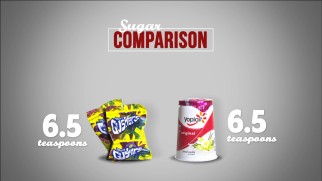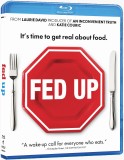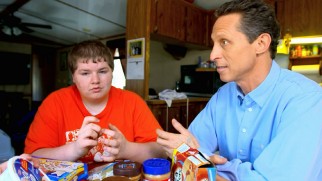Fed Up Blu-ray Review
 |
Fed Up
Theatrical Release: May 9, 2014 / Running Time: 96 Minutes / Rating: PG Director: Stephanie Soechtig / Writers: Mark Monroe, Stephanie Soechtig Narrator: Katie Couric / Tagline: Congress says pizza is a vegetable. Interview Subjects: Brady Kluge, Tinna Kluge, Joe Lopez, Maria Lopez, Edgar Lopez, Andrew Randall, Wesley Randall, Dr. Mark Hyman, Dr. Robert Lustig, Dr. David Ludwig, Dr. David Kessler, Dr. Deborah Cohen, Dr. Richard Carmona, David Allison, President Bill Clinton, Gary Taubes, Dr. Harmony Karp, Duff Wilson, Margo Wootan, Marion Nestle, Michael Moss, Michael Pollan, Lisa Gable, Tom Vilsack, Vivian Phillips, Dr. Risa Lavizzo-Mourey, Senator Tom Harkin, Michele Simon |
Buy Fed Up from Amazon.com: Blu-ray • DVD • Instant Video
Eating is one of very few things that all people do, so maybe it's not so surprising that it has been the subject of some of the more influential documentaries of recent years. Super Size Me, Food, Inc., and Forks Over Knives have all encouraged some people to change the way they eat, The film opens with some facts about the obesity epidemic facing the world and especially the United States. It reveals that in the past couple of decades, the obesity rate has doubled along with gym memberships. Unfortunately, it uses that correlation to question the age-old wisdom that the most effective way to lose weight is to exercise more and eat less. Sure, that's not a foolproof plan, but it's the best we have and it makes plenty of sense.
Fed Up doesn't want to place any blame on the lifestyles of the obese, instead finding it easier to wag its finger at their environment. Already, in its opening fifteen minutes, I fear the film has misled the average viewer with its dismissal of "eat less, exercise more." Much of what it has to say is valid and worth heeding, but to side-step the most obvious solution to weight problems seems downright irresponsible.
The film profiles a number of obese adolescents, one of whom claims to lead an active life (walking the dog every day and swimming sometimes!), but all of whom eat unhealthily and seem to be miserable as a result. A host of experts and authorities, from President Bill Clinton to nutritionists, authors, and a former Surgeon General, weigh in on some of the causes of obesity beyond sedentarism. Their targets: processed foods, the power of soft drink companies' bottomless financial resources, and the ineffectiveness of government reform.
Some striking statistics are shared. For instance, if we continue at current rates, 1 in 3 Americans will have diabetes by 2050. And in a study, 40 out of 43 cocaine-addicted lab rats preferred sugar water to cocaine. Sugar is addictive and it's everywhere, even in foods pitching themselves as healthy alternatives. The film likens the food industry to Big Tobacco, which notoriously resisted reform for years and ludicrously disputed health claims. Fed Up aims to expose "Big Sugar" of the same self-serving, deep-pocketed deception.
The film notes that the leading manufacturers of processed foods balked when the World Health Organization recommended that no more than 10% of our caloric intake come from sugar (earlier this year, WHO lowered that figure to 5%). Junk food producers decided up to 25% was safe. That they couldn't agree is part of the reason why no daily value percentage accompanies sugar on Nutrition Facts labels.
That is problematic and perhaps more so than the other issues and potential solutions raised here. Michele Obama's "Let's Move" campaign is criticized for evolving from "eat healthy" to simply "exercise more." Fed Up also takes aim at school lunches, citing the ubiquity of sodas and unhealthy foods whose sale brings the school money. Also assigned blame: junk food's unregulated child-oriented advertising, the prominent placement of unhealthy foods by all checkout lines, and the fact that money always trumps concern for public health. Campaigns to promote healthy eating inevitably seem to just promote eating so as to keep agriculture production on the rise. A case study shows the government trying to make use of the excess fat removed from skim milk, turning it into cheese it heavily advertises.
The film blames government for not adopting more rigid policies and for the kneejerk reactions that inevitably arise to resist reformation, bemoaning government interference as some kind of "nanny state."
This is the second film written and directed by Stephanie Soechtig. Her first, 2009's Tapped, explored the hazardous effects of the bottled water industry. Fed Up is full of catchy animated graphics and valuable source video, from the news reports of narrator/executive producer Katie Couric to fun old fast food commercials. It lacks the entertainment value of a Morgan Spurlock documentary and is less than convincing in a number of the arguments it makes, undermining some of the more salient facts and figures it unearths.
VIDEO and AUDIO While licensed footage is hindered by age and source, Fed Up's newly-shot 1.78:1 material looks sharp, vibrant, and basically flawless on Blu-ray. The 5.1 DTS-HD master audio soundtrack similarly satisfies with its fine distribution of Couric's crisp narration, interview audio, and music.
BONUS FEATURES, MENUS, PACKAGING and DESIGN The bonus feature the case most touts is a Spanish language version of the film, narrated by Goal! star Kuno Becker. The other major extra is a group of five deleted scenes (12:46), which include Dr. Mark Hyman making a house call to demonstrate to the focal Kluge family how to cook real food at a reasonable price (wisdom the family doesn't seem to appreciate at all). Also included here are profiles of two additional obese teenaged girls and a brief mention of "slotting fees", the money the big soda companies pay to get prominent displays in supermarkets. The Blu-ray opens with an SD trailer for Bully, and HD ones for Inequality for All and The Unknown Known. These aren't available by menu and Fed Up's trailer isn't included at all. The animated menu alternates between film clips and graphics, utilizing the "F" and "U" M&M-like candy used in marketing art quite provocative for something rated PG. An insert inside the plain blue keepcase form generously and fittingly extends a free one-year, 6-issue subscription (a $10 value) to Eating Well magazine.
CLOSING THOUGHTS Fed Up has some important information regarding eating healthy and the pressure to do otherwise. Unfortunately, it places way too much responsibility on government regulation and not enough on parents and children making good choices and leading active lives. I generally assume documentaries know what they're talking about, but I question this one for its missed opportunities and disappointing skewered presentation of facts. While so many people out there need a wake-up call about the way they eat and live, there's got to better films out there than this to serve that purpose. Buy Fed Up at Amazon.com: Blu-ray / DVD / Instant Video
|
Related Reviews:
DVDizzy.com | DVD and Blu-ray Reviews | New and Upcoming DVD & Blu-ray Schedule | Upcoming Cover Art | Search This Site
DVDizzy.com Top Stories:
Bully • Waiting for "Superman" • Chasing Ice • The Unknown Known
POM Wonderful Presents The Greatest Movie Ever Sold • The Imposter
New: Moms' Night Out • Blended • Draft Day • Trust Me • Divergent • Bears
Text copyright 2014 DVDizzy.com. Images copyright 2014 Radius-TWC, Diamond Docs, Artemis Rising Foundation, Atlas Films,
The Weinstein Company Home Entertainment, and Anchor Bay Entertainment. Unauthorized reproduction prohibited.








